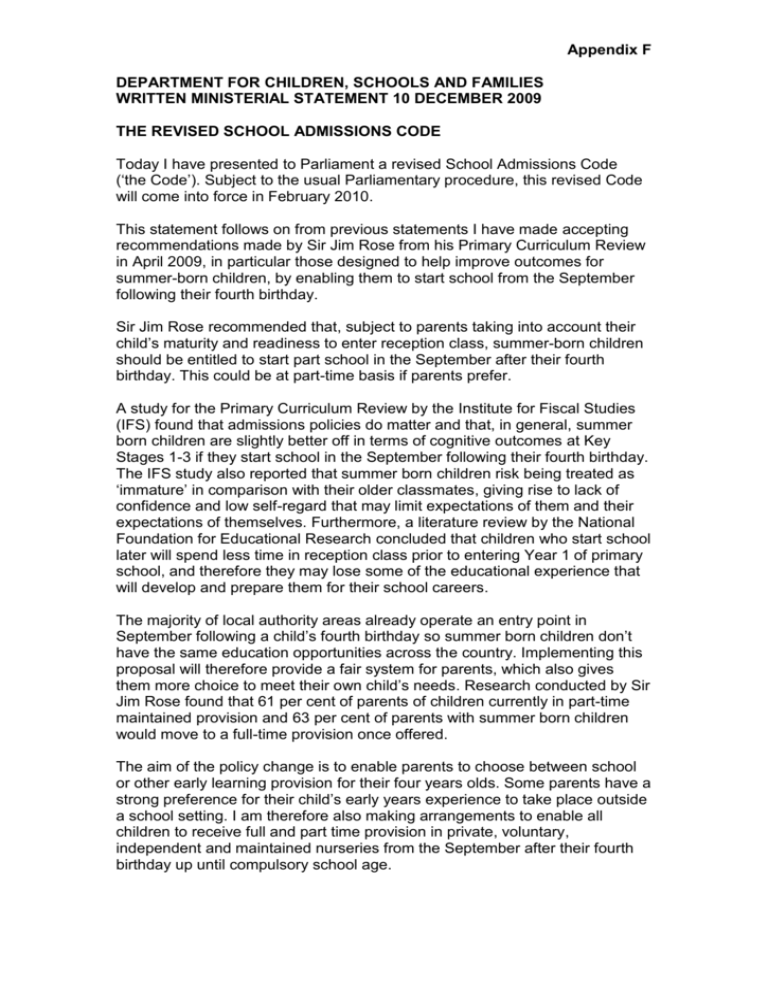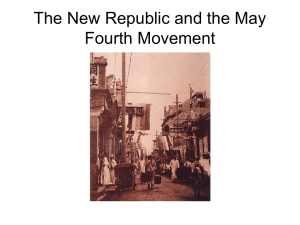DEPARTMENT FOR CHILDREN, SCHOOLS AND FAMILIES
advertisement

Appendix F DEPARTMENT FOR CHILDREN, SCHOOLS AND FAMILIES WRITTEN MINISTERIAL STATEMENT 10 DECEMBER 2009 THE REVISED SCHOOL ADMISSIONS CODE Today I have presented to Parliament a revised School Admissions Code (‘the Code’). Subject to the usual Parliamentary procedure, this revised Code will come into force in February 2010. This statement follows on from previous statements I have made accepting recommendations made by Sir Jim Rose from his Primary Curriculum Review in April 2009, in particular those designed to help improve outcomes for summer-born children, by enabling them to start school from the September following their fourth birthday. Sir Jim Rose recommended that, subject to parents taking into account their child’s maturity and readiness to enter reception class, summer-born children should be entitled to start part school in the September after their fourth birthday. This could be at part-time basis if parents prefer. A study for the Primary Curriculum Review by the Institute for Fiscal Studies (IFS) found that admissions policies do matter and that, in general, summer born children are slightly better off in terms of cognitive outcomes at Key Stages 1-3 if they start school in the September following their fourth birthday. The IFS study also reported that summer born children risk being treated as ‘immature’ in comparison with their older classmates, giving rise to lack of confidence and low self-regard that may limit expectations of them and their expectations of themselves. Furthermore, a literature review by the National Foundation for Educational Research concluded that children who start school later will spend less time in reception class prior to entering Year 1 of primary school, and therefore they may lose some of the educational experience that will develop and prepare them for their school careers. The majority of local authority areas already operate an entry point in September following a child’s fourth birthday so summer born children don’t have the same education opportunities across the country. Implementing this proposal will therefore provide a fair system for parents, which also gives them more choice to meet their own child’s needs. Research conducted by Sir Jim Rose found that 61 per cent of parents of children currently in part-time maintained provision and 63 per cent of parents with summer born children would move to a full-time provision once offered. The aim of the policy change is to enable parents to choose between school or other early learning provision for their four years olds. Some parents have a strong preference for their child’s early years experience to take place outside a school setting. I am therefore also making arrangements to enable all children to receive full and part time provision in private, voluntary, independent and maintained nurseries from the September after their fourth birthday up until compulsory school age. Appendix F Parents who prefer to delay their child’s starting school would be able to defer a school place until compulsory school age – as they can already do now. But it’s right that all children should be in school – playing and learning and developing – from age five. The four years olds proposal is just one of many recommendations made by the Primary Curriculum Review aimed at giving greater parental choice and improving transition and outcomes for all children, particular summer-born children and vulnerable groups such as those with SEN, who Sir Jim felt would benefit most from starting school early. We are already reforming the primary curriculum to encourage a smoother transition from Early Years Foundation Stage (EYFS) into school by arranging the curriculum in six areas of learning (similar to EYFS areas of learning and development) and free it up for teachers. This supports my proposal by creating an appropriate school environment for all four years olds. Continuing play based learning into primary schools and ensuring children receive learning experiences appropriate to their age and circumstances is a key feature of the new primary curriculum. Whether in reception classes, or in nurseries, four year olds will benefit from receiving the Early Years Foundation stage full-time. Also in line with my earlier statement, over the next few months, we will provide information to parents and local authorities about the optimum conditions, flexibilities and benefits to children of entering reception class in the September immediately after their fourth birthday. Following a consultation on relevant changes, this revised Code will require all admission authorities to provide for the admission of children following their fourth birthday, from September 2011 onwards.








